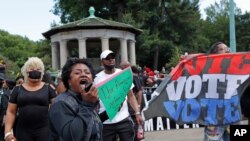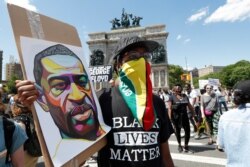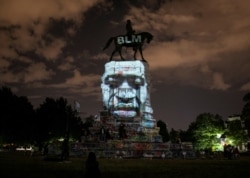Widespread and sustained protests demanding racial justice have brought down monuments, prompted some U.S. cities to bar police choke holds and spurred greater recognition of Juneteenth, which commemorates the emancipation of slaves in America.
But has the Black Lives Matter movement attracted enough committed, vocal adherents to effect far-reaching change and fundamental reforms in a nation that typically returns to business as usual once protests fade?
Washington, D.C., protester Jay Brown believes the answer is yes.
“My people will stand up and keep fighting,” Brown, who is African American, told VOA at a demonstration near the White House on a city block renamed “Black Lives Matter Plaza.” The area has been ground zero for protests in the nation’s capital since May 25, when George Floyd, an African American, died in police custody in Minneapolis, Minnesota - an incident that shocked the conscience of many people of all ethnicities and sparked an outpouring of grief and anger on America’s streets.
“This is a national movement that will lead to new laws to protect people of color,” Brown said. When asked if America has reached a tipping point in the quest for racial justice, he replied, “Most certainly.”
Movement Gaining Strength
Many observers agree, noting that Black Lives Matter, founded in 2013 to demand an end to police brutality, has a gained significant momentum and backing from a broad spectrum of American society in recent weeks.
“These racial justice demonstrations seem just as transformative as the civil rights protests of the 1960s,” American University political historian Allan Lichtman told VOA.
Lichtman notes that sustained activism shifted public opinion and paved the way for the Civil Rights Act of 1964, which outlawed discrimination based on race, color, religion, sex, and national origin.
But what initially may look like achieving critical mass for change in America frequently fails to deliver concrete or lasting results.
“As we learned in the climate change and gun control movements, it takes more than just a quick surge in public opinion to sustain it,” Lichtman said. “It takes galvanizing support from a majority of people to create lasting changes.”
Critical Mass
Originally coined by nuclear physicists, the term “critical mass” first appeared in socio-political writings in the 1960s. University of Chicago political science professor Morton Grodzins described critical mass as the point at which a group or movement achieves the size and impact required to bring about change. The term can also refer to a tipping point that alters the course of unpredictable events.
Grodzins used critical mass to describe so-called “white flight” from urban areas, arguing there was a point at which the departure of Caucasians assured a neighborhood would become populated entirely by racial minorities.
Since then, the term commonly refers to the point at which change – negative or positive - becomes inevitable.
Shifting Opinions
Whether the Black Lives Matter movement has achieved critical mass to change laws and fundamentally alter American society remains to be seen. Earlier this month, the Pew Research Center reported a surge in public support for the movement, with 67% of Americans backing it to some degree, including 60% of white respondents.
“I've just been astounded by the polling numbers now which show more than two thirds of Americans support the racial justice movement,” Lichtman said.
Researchers note that polling data has a mixed record as a predictor of change. For years, public opinion surveys have shown overwhelming support for basic gun regulation in America such as universal background checks for firearms purchases. Yet even modest gun reform proposals remain stalled on Capitol Hill.
But researchers also note examples where shifting public opinion foreshadowed dramatic change, as has been the case for sexual minorities in America. In the 1990s, fewer than one-in-four Americans backed same-sex marriage. By 2015, when the Supreme Court legalized unions for gays and lesbians nationwide, polls showed support rising above 60%.
“You'd be hard pressed, except for maybe marriage equality, to see such a dramatic shift in the majorities of Americans supportive of what these racial justice protesters are doing [today],” Todd Shaw, a University of South Carolina political scientist, told VOA. “Having majorities on your side matters in a democratic society.”
Shaw notes that, beyond expressing outrage over the death of George Floyd, a growing number of Americans see his demise as symptomatic of a larger problem of systemic racism. And their representatives in Congress seem to have taken note. Democrats and Republicans have scrambled to introduce competing bills reforming law enforcement in America.
“I think we have achieved some level of critical mass because what was once unthinkable is now on the agenda, like .. completely revamping a police department. These things have developed rapidly,” Shaw said, adding that, to sustain a reform agenda, the Black Lives Matter movement will have to demonstrate its clout at the ballot box in the upcoming election.
“The movement’s impact will be tested in November, if not well after that,” he said.
At Black Lives Matter Plaza, demonstrator Jay Brown says he and others have steeled themselves for a sustained fight: “We have to stand up for change and keep protesting until we achieve it.”








